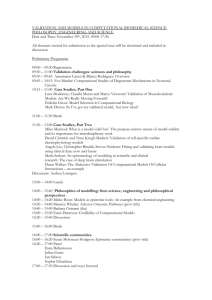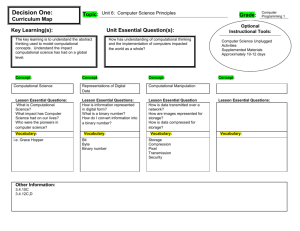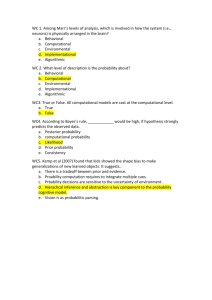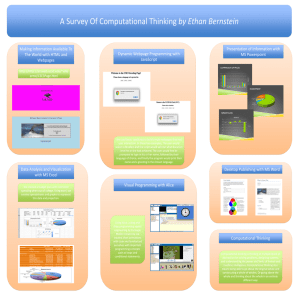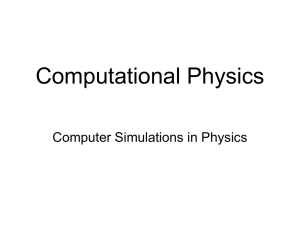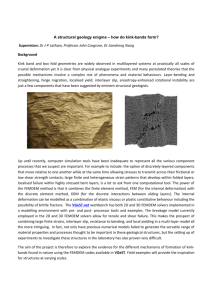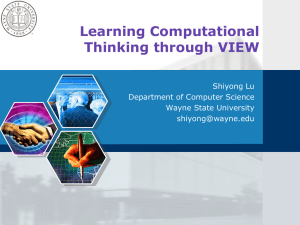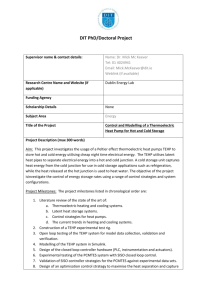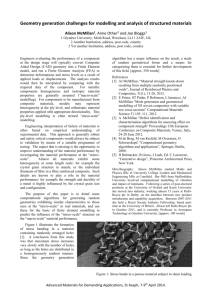Philosophy, Engineering - Department of Computer Science
advertisement
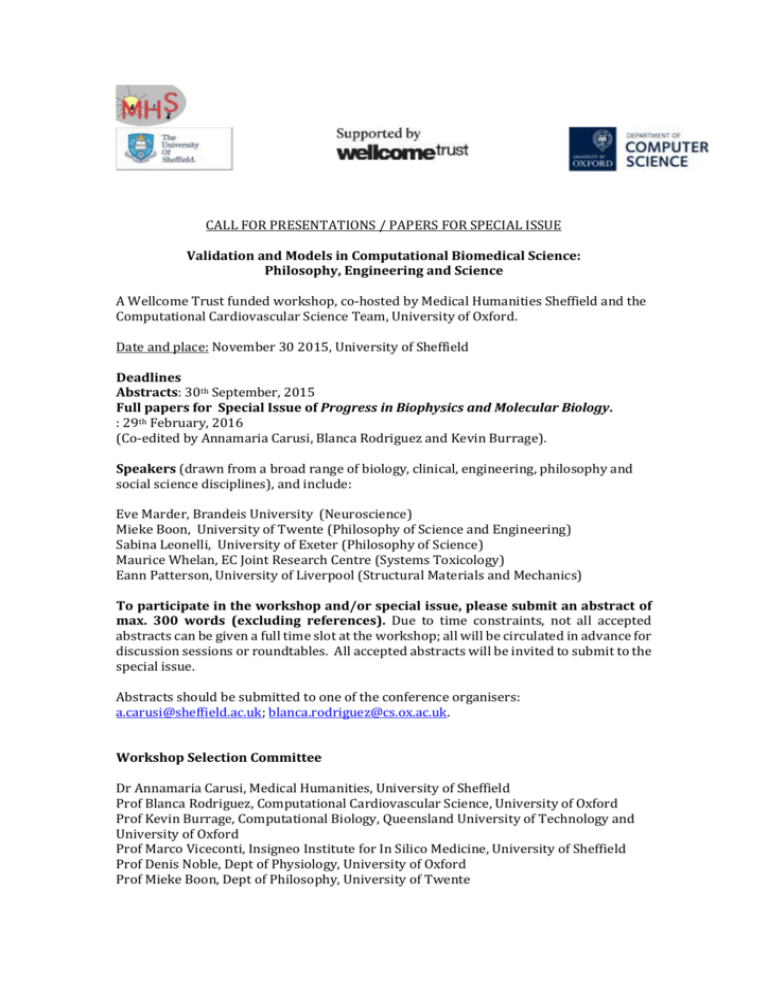
CALL FOR PRESENTATIONS / PAPERS FOR SPECIAL ISSUE Validation and Models in Computational Biomedical Science: Philosophy, Engineering and Science A Wellcome Trust funded workshop, co-hosted by Medical Humanities Sheffield and the Computational Cardiovascular Science Team, University of Oxford. Date and place: November 30 2015, University of Sheffield Deadlines Abstracts: 30th September, 2015 Full papers for Special Issue of Progress in Biophysics and Molecular Biology. : 29th February, 2016 (Co-edited by Annamaria Carusi, Blanca Rodriguez and Kevin Burrage). Speakers (drawn from a broad range of biology, clinical, engineering, philosophy and social science disciplines), and include: Eve Marder, Brandeis University (Neuroscience) Mieke Boon, University of Twente (Philosophy of Science and Engineering) Sabina Leonelli, University of Exeter (Philosophy of Science) Maurice Whelan, EC Joint Research Centre (Systems Toxicology) Eann Patterson, University of Liverpool (Structural Materials and Mechanics) To participate in the workshop and/or special issue, please submit an abstract of max. 300 words (excluding references). Due to time constraints, not all accepted abstracts can be given a full time slot at the workshop; all will be circulated in advance for discussion sessions or roundtables. All accepted abstracts will be invited to submit to the special issue. Abstracts should be submitted to one of the conference organisers: a.carusi@sheffield.ac.uk; blanca.rodriguez@cs.ox.ac.uk. Workshop Selection Committee Dr Annamaria Carusi, Medical Humanities, University of Sheffield Prof Blanca Rodriguez, Computational Cardiovascular Science, University of Oxford Prof Kevin Burrage, Computational Biology, Queensland University of Technology and University of Oxford Prof Marco Viceconti, Insigneo Institute for In Silico Medicine, University of Sheffield Prof Denis Noble, Dept of Physiology, University of Oxford Prof Mieke Boon, Dept of Philosophy, University of Twente Dr Sophia Efstathiou, Dept of Philosophy, Norwegian University of Science and Technology Dr Susan Molyneux-Hodgson, Dept of Sociology, University of Sheffield Workshop Description Computational modelling and simulation in all areas of biological and biomedical research have developed to a point where there is a highly sophisticated array of tools and techniques. Data intensive methods, network and multiscale models have the potential to provide new insights into biological mechanisms integrating sub-cellular, cellular, tissue, organ and potentially whole organism levels. Intensive research is currently focused on how to harness these methods and approaches for translational medical research, such as for drug discovery, drug and medical device safety testing, diagnosis and treatment régimes. In addition they are poised to enhance the capacity to use human derived data, and to contribute to the refinement, replacement and reduction of animal based research. The aim of modelling and simulation is to arrive at data and computational models that are ‘validated’; yet how to achieve validation is not always clear. While methodologies to tackle validation are often discussed, the deeper conceptual frameworks in which methodologies are embedded get less attention. As issues such as the pervasive variability of biological systems and model uncertainty increasingly come to the fore; and as the drive to find medical applications for computational modelling and simulation gains momentum, there is a need for creative reconceptions of the whole modelling process. This encompasses not only the scientific and engineering approaches, but also, crucially, the disciplinary, social and institutional dynamics associated with translation. Computational biological and biomedical sciences are highly interdisciplinary, but different disciplines and sectors often have conflicting conceptual frameworks for understanding validation. This makes the social, cultural and institutional aspects of modelling and simulating vital, and this becomes even more marked as computational approaches cross over into the clinical and pharmaceutical sectors, and then take on radically different uses and purposes. Furthermore, the broad public of health care users, who also need to become active stakeholders in the enterprise of computational modelling and simulating, have their own different understandings of the goodness and validity of models. These potentially conflicting conceptual frameworks and understandings can have a significant impact on the success of collaborations across disciplines and across academic, clinical and industrial sectors, and on public acceptance. This in turn impacts on the successful implementation of computational modelling and simulation in biomedical applications. At the same time, several social scientists and philosophers have focused their attention on the social factors and epistemology of modelling spurred by the advent of new computational tools and techniques. There is however relatively little dialogue across the social science, philosophy, science, engineering and technology development communities. There are missed opportunities here, for learning and broaching the issues that challenge the implementation of computational modelling in biomedical contexts. The ‘Validation and Models in Computational Biomedical Science’ workshop and special issue will provide one such opportunity. Our aim is to provide a platform for discussion and practice across scientific, engineering, clinical, philosophical and social perspectives on the central question of model validation that transcends any single discipline or sector, but which will potentially make a difference to practice. In particular, we are interested in understanding the conceptual frameworks that scientists and engineers use in their practices of modelling and simulation, and in how philosophers and social scientists can make an input in shaping computational biomedicine, as active participants. In dialogue across disciplines and sectors, participants will work to articulate the challenges of computational approaches to biomedical sciences and ‘translations’, and consider how a multi-perspectival approach can be put into practice. We invite papers and presentations that address any of the following questions: What are the conceptual frameworks for validation, and what are their limits? How can these limits be overcome? What can ‘validation’ mean in the face of biological variability, model uncertainty and other challenges? Is ‘validation’ the right term to use? What does it imply, what does it mean, and are there alternatives? What is the relationship between validation and other terms, such as ‘explanation’ and ‘prediction’? How does the understanding of validation shift according to the purpose or use of modelling? What are the criteria of validation of different sectors (academic, clinical, pharmaceutical or regulatory)? What are the social / epistemic conditions for model validation? What are the interconnections between these social and epistemic conditions? How can socially and philosophically informed epistemologies of validation contribute to debates about validation? How do conceptions and cultures of model validation play out in the social and public sphere of health care users and patients? Papers and presentations should not stop at setting out methodologies, but should reflect on the conceptual framework and / or social dynamics of those methodologies; papers from philosophers and social scientists should engage with the concerns and issues faced by modellers in practical settings. Presentations and papers that result from science / humanities collaborations and exemplify how these collaborations can work, are especially welcome.
